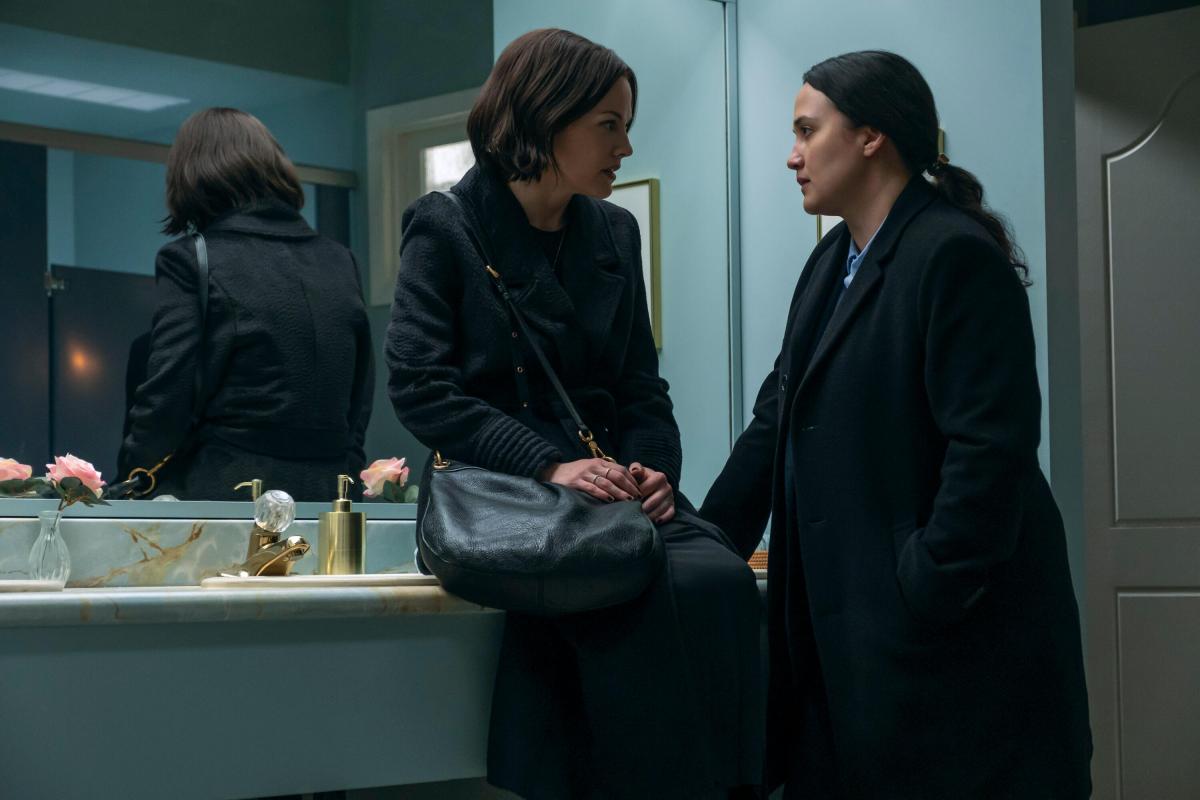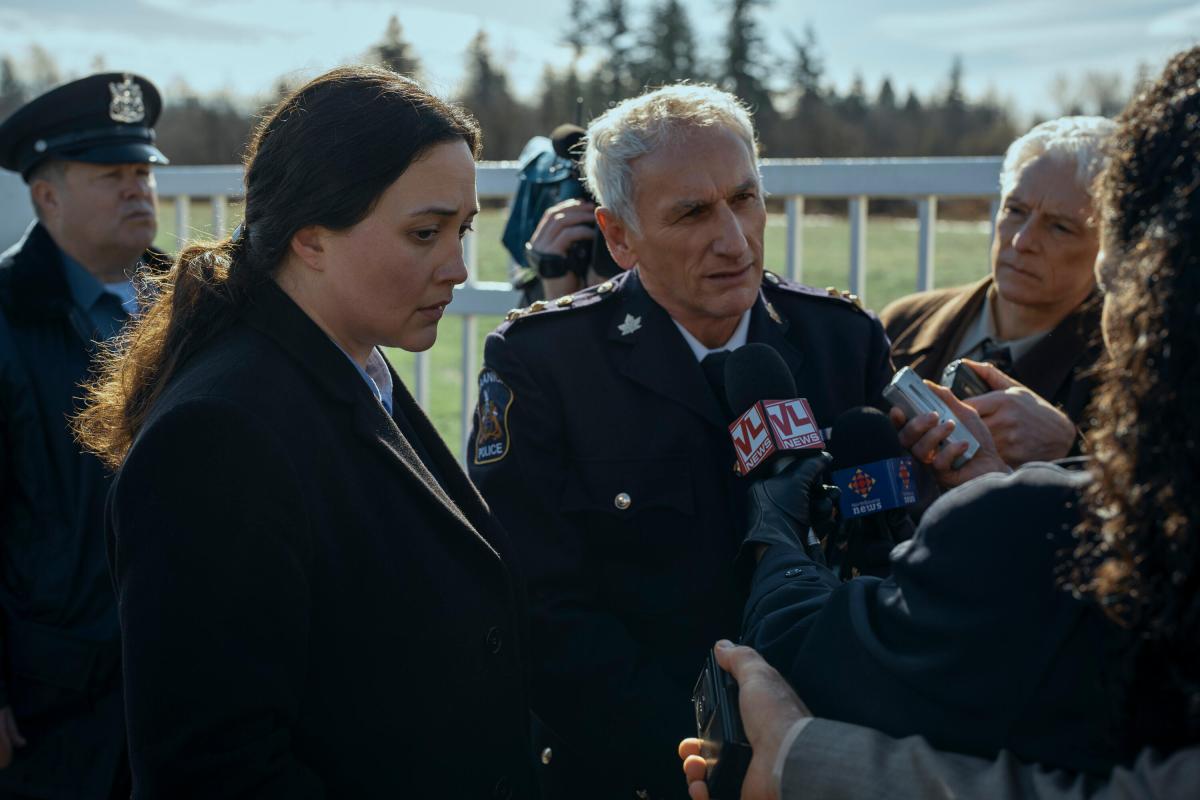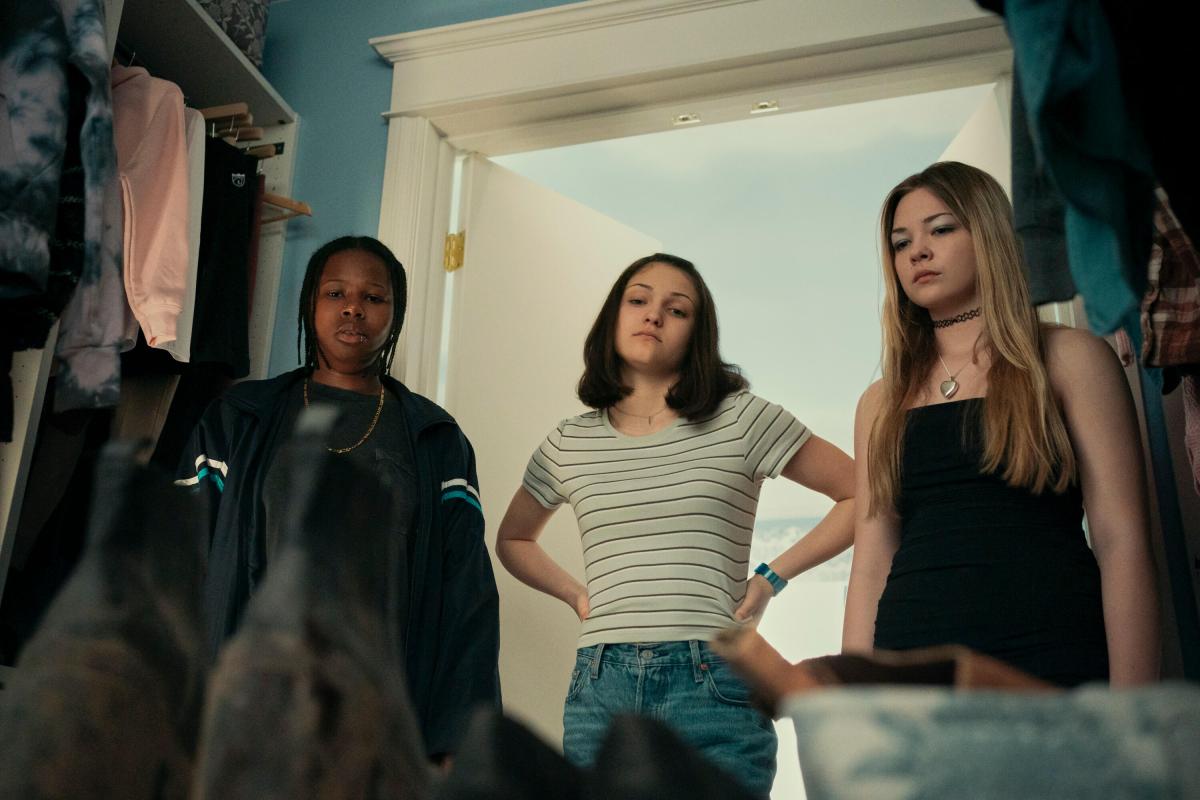Turning a true story of the brutal murder of a teenage girl into an entertaining television program is, at best, awkward, and at worst exploitative. Under the Bridge walked the line with relative mastery for its first four episodes. In the fifth, slight cracks in this endeavor begin to show. But first, we do in fact have Rebecca and Cam speaking intimately in a bathroom again. They do not make out, which would be inappropriate, but Cam does tell Rebecca that she looks pretty.

(Photo by: Jeff Weddell/Hulu)
There are several elements of the true story that were tweaked for Under the Bridge‘s dramatization, and all of these come to bear in “When The Heat Comes Down,” with mixed results.
The first is traditional in adaptations — the sprawling narrative and its many characters are cleaned up, with more extraneous figures cut entirely to keep big moments in the hands of the primary cast. That primary cast includes the invented character of Cam as well as Rebecca Godfrey herself, who wasn’t actually in Victoria when the murders happened, and therefore must not only be written into this story, but centered. In reality, there was no need for a grown woman to drop acid with a group of Troubled Teenagers in, seemingly, an abandoned warehouse, in order to get some kind of scoop. (Arguably there was also no need for this within the fictionalized narrative too, but I digress!)
It was two teenage sisters, Nadja and Anya, survivors of an “unfortunate” home situation and veterans of the foster care system, who actually got the information the cops apparently needed to start investigating. While Anya had just been placed in a new, posh foster home at the time of the murder, Nadja was living in Seven Oaks. Her new roommate was Josephine, who immediately began bragging about the beating and told Nadja how her best friend had gone back under the bridge, found Reena, beat her up more, and then drowned her.
Nadja told Anya what she’d heard and, despite their warranted mistrust and deep loathing of the police, Anya pressed Nadja to speak up. She did, and that cop thought the story sounded far-fetched. Both sisters were frustrated by the officers’ condescending tones towards them. He did, at least, take the initiative to call his neighboring county to see if there was a missing girl in Saanich, and of course, there was, her mother had reported her missing a week ago and was actively doing her own investigation, calling everyone her daughter knew to ask if they’d seen her.
Thus, a cop questioned Dusty and Josephine at Seven Oaks, who recited identical stories of un-involvement with Reena’s disappearance. While Dusty, Kelly and Josephine began plotting their escape to Mexico, Nadja grew restless, thinking, as Godfrey wrote in her book, If the cops can’t figure out this shit, then me and Anya will. Nadja asked Josephine to show her where it happened. She called Anya, who literally was excused from class to accompany Nadja on this journey. The sisters hyped Josephine up, faking how impressed they were with the tale so she’d keep telling it. They returned to the police station to share their new information, continuing to question why no moves had been made to search the gorge or question Kelly. A cop who was friends with Kelly’s family and closer friends with another friend of Kelly’s, Maya, used her “in” to get a lead from Maya — she’d seen Kelly and Warren walking on the bridge that night.
It was at this point that the cops descended on a party held in a field and arrested everyone. This is where the official questioning began, and where Kelly was immediately given the legal and financial support her peers lacked.
That’s a sprawling narrative, to be sure, introducing new characters and moving pieces around on the timeline. Putting Rebecca into that “investigator” role does give her and Cam a reason to frequently see each other, which I personally appreciate. I appreciate every phone call, every lingering glance, the ways they challenge each other. Although I realize she’s writing a book and needs information, she is at least partially driven by a desire to help Cam, who she has obvious feelings for. But some of Rebecca’s Inspector Gadget efforts begin to seem a bit far-fetched, starting with Becca’s transparent efforts to coerce the girls into handing over evidence or believing that she’ll help them run away to Mexico and continuing with her choice to accept psychedelic drugs from teenagers she’s never met before to prove she’s not a cop. (It’s like…. rule one of psychedelic drugs to only do them in safe situations with people you trust!)
Some valuable character work comes out of this for Rebecca, however, as we see how self-destructive she is as an adult and how she’s literally haunted by memories of her brother’s death and seems to feel somehow responsible for it. One of Under the Bridge‘s most effective themes is one often encountered in conversations around criminal justice reform — that we are more than the worst thing we ever did. By giving grace to these kids, she’s in some way attempting to give that same grace to herself. Rebecca’s instinct is that these kids need is unconditional empathy and compassion. Cam agrees on some level, but her empathy is conditional — she’s here to advocate for Reena first and foremost and feels that these kids need not just compassion, but also guidance, leadership and, as appropriate, discipline.
Ultimately, it’s Cam’s evolution in this episode that really lands. In the first episode, Cam was defensive when the Virks implied they’d hoped for a bit more solidarity from her than from her white brother. Now, we see her perspective shifting. While she maintains neutrality when Rebecca expresses incredulity over how swiftly Manjit was arrested for abuse without evidence, her agreement is clear later when she challenges her father on that topic and how racism was clearly a factor. She usurps the spotlight from her dad’s lazy platitudes about their “multi-ethnic community” where “everyone is welcome” during a press conference to suggest Reena’s attack may have been racially motivated. After bringing Dusty into the station after Dusty’s failed attempt to move back in with her family, she points out that Kelly’s record is nearly identical to Dusty’s and yet Kelly’s never been subjected to punishment like Dusty has.

(Photo by: Darko Sikman/Hulu)
Under the Bridge continues leaning in to the notion of safety, and how efforts to provide safety are often smokescreens for more sinister motives, and rarely occur without collateral damage. (I kept thinking of the title of Roxane Gay’s essay, The Illusion of Safety / The Safety of Illusion.) Dusty’s sister wants to keep her daughter safe from Dusty, but in doing so, Dusty’s own safety is compromised. The state justifies its swift arrest of Manjit as an effort to keep Reena safe, but the result is an innocent man thrown in jail by a racist system and Reena getting more freedom to do “unsafe” things like drink and smoke and develop allegiances with her future killers. He’s let out and then forced to keep himself “safe” from so much as a conversation with his daughter to prevent further criminal charges.
Reena Virk’s choice to accuse her father of sexual molestation to get moved out of her house an into state care did actually happen, although the true story is slightly worse and the logistics have been simplified. For example, Reena’s allegations ramped up over time, and she actually lived with her mother’s parents for several months prior to entering state care, and her grandparents believed her allegations — which obviously broke Manjit’s heart. Still, the jist remains the same.
We’re reminded frequently in Under the Bridge that teenagers have underdeveloped fontal lobes and are making moves with zero thought towards consequences or long-term impact. Reena’s choice is hard to reconcile. We see that she’s lonely and friendless, that she’s teased for having hairy legs, that she spends most of her time in predominately white spaces and, like so many teenagers, feels ashamed about everything that makes her different.
There’s even more context provided in Reena: Her Father’s Story, written by Manjit Virk. He writes of how his daughter had been bullied consistently most of her life and thus hated school. He described her as a “big girl,” often teased for her weight and the tallest human at her graduation, trying desperately to hide behind her peers. She struggled with severe eczema, she had acne, she grew depressed and moody. These elements of Reena’s physicality aren’t captured by actor Vritika Gupta, but Gupta still delivers a commanding performance.
When Reena’s family had moved to Sannich West in 1994, they’d hoped Reena would find a fresh start and make friends, but the one friend she made shunned her after their first, encouraging hangout. When a group of teenagers smoking in a park said hello to her in July of 1996, it was the first time Reena had ever felt seen or desired by anybody. “Because Reena felt no one else would accept her, she wanted to hang out with this group who bragged about freedom from house rules,” he wrote. Essentially: Josephine was the first friends Reena ever had, and as portrayed in Under the Bridge, she was ruthlessly manipulative.

(Photo by: Darko Sikman/Hulu)
I can relate to Reena’s frustration over her parents’ rules, I too felt absolutely oppressed in that self-obsessed bratty teenage way by having the strictest mother of anybody I knew, absolutely stymied by the injustice of my mother prohibiting me from doing things all my peers were allowed to. But reporting a parent for abuse they never committed is so beyond the pale. While many of these kids are acting out due to abuse and neglect from their families, Reena is in many ways a product of the abuse she suffered from her peers — right until the bitter end.
Ironically, it was the system’s abuse of her father, in real life, that sealed her fate. Reena had returned home for a rare overnight visit on the night she was murdered and, as Manjit writes in his book: Under normal circumstances, I would not have allowed her to go out without knowing her friends and the time of her return. But i feared that any firmness on my part now would be mistaken for force and abuse.
Rebecca introduces an idea this episode that we’ll continue to grapple with as the story continues: “I don’t think putting a bunch of teenagers in jail is good for anything.” What can we understand, even if we can’t excuse it? We do know that experiencing abuse never justifies inflicting it on others. We know Kelly Ellard is clearly unsympathetic, a psychopath enabled by her wealthy parents. But what about these other kids? What should happen to them? What about Warren? Josephine? Dusty? What is “justice” and how do we achieve it?
What’s clear already is that none of these questions have easy answers, and some might not have answers at all.
If you like this review, you’d probably love my new TV newsletter, What the Gays Are Watching, which is a perk for AF+ Members! For only $4 a month, you can join AF+ Media and get access to all our premium content, our new TV and Film newsletters — and enjoy an ad-lite (but usually completely ad-free!) reading experience.



It’s a credit to Reough that I still am rooting for Rebecca, despite the sometimes obnoxious or hare-brained schemes she devises. One thing I like about her rapport with Cam is that Cam’s groundedness (softened by softness/desire/history towards Rebecca) curtails Rebecca’s hard-edged chain-smoking manic pixie dream investigator energy. Rebecca never seems more like a real –– complex and grieving and in some ways aimless in other ways hyper-focused –– person.
I think it was in an interview I read that referenced how Godfrey didn’t so much see Gabe in Warren, as herself – all the ways she was vulnerable, miserable, messed up, and susceptible to bad decisions as a teen –– and how her life could easily have been otherwise. That insight made me respond to the acid disclosures with a bit more grace…. but beyond that some of her tactics this episode are bananas. I was almost relieved that Kelly didn’t buy into them (that would have felt so insincere on the part of the show’s plotting). I could see Dusty being eager for being saved, and I actually like how Jo’s naivete – as with the imagined dream of going to New York that was always some fantastical projection – reveals her vulnerabilities that exist not beneath but alongside the tough facade and very real violent and manipulative behavior.
ugh, writing too fast – obviously Keough, but also didn’t fully finish this thought:
Rebecca never seems more like a real –– complex and grieving and in some ways aimless in other ways hyper-focused –– person *than when she shares space with Cam.*
yes, i totally agree about what they bring out in each other! rebecca comes off as sort of trapped in her teenage angst (in a future ep they have flashbacks to when she was a teenager and it’s very much like “yes this makes perfect sense!”) but cam is such a strong balance, there. i want a spin-off where i can simply root for them in a lighter context !
and yeah i was oddly relieved when kelly didn’t buy it cuz i was like… someone on this screen has to be willing to point out how transparent and absurd this is! when she leans over and is like “if you have any evidence with DNA, you should give it to me” i was like 🙄
rebecca relating to warren becomes even clearer in future episodes, too — i’m always endeared towards narratives that understand good people doing bad things and the reasons why, and also how difficult it is to understand anybody’s behavior outside of specific context (especially when people are impacted by peer pressure and emotional manipulation). obviously nothing excuses physical assault, let alone murder. but i think a lot of people can grow and change and hope for redemption.
yes, the invitation to the view to sit with the discomfort of the complexity of Reena, Jo, Warren Dusty, Reena’s parents, all of them – people whose actions we can perhaps understand if still not condone – is why I find the show compelling.
Keough does an excellent job of communicating that kind of trapped adolescence, even just with her physicality, like when she scoot up onto the bathroom counter in ep 5 while talking to Cam. It also makes me wonder what she’s like in her life in NYC…. like, I imagine some of this is present, but also being back in Victoria after so long away, so many of the same folks and cross-currents still at play, it’s like she’s falls back into that teenage self.
I’m excited we may get more insight into their teen years… based on offhand details that have been peppered in dialogue across the episodes, I’m now wondering if Cam was adopted by the police chief’s family as a young child, but then got in trouble as a teen (probably related to Becca, in some way) and that’s when she ended up at Seven Oaks. (I’ve been curious about that line Becca says at the bar, “You shoudn’t have had to give anything up for me,” and I think it must be related.)
thanks for the teasers, reflections, rapport, and coverage, riese!
I usually tweet about what I’m watching but this is one of those I chose not too. I didn’t know it was based on true events til the opening credits. It’s especially hard to watch a story around a child’s murder. The actress is playing Reena pretty good.
When she slightly smiled through the window after her father was arrested, I wondered if that actually happened. I had such mixed emotions. I seem to get that a lot with the show. You’re angry what she did but sad her life was needlesly taken. I did think Rebecca trying to trick them was obvious but I got the feeling the character was trying to set the stage for them to scramble and mess up so Cam could catch them. Kelly going around flashing her privilege, while Josephine and Dusty are mandated to Seven Oaks, make me think of a murder commited by two kids I went to school with in high school during the 90s. One a doctor’s kid, the other a bit of an outsider. It’s a difficult watch for sure.
reena was living with her grandparents when he was arrested — she’d decided to report her false accusations to the police since her grandparents were starting to push for her to go live back at home — so she wasn’t actually there at the time of his arrest. but he writes about his other two children watching sadly from the window as he was taken to jail and it’s really heartbreaking!